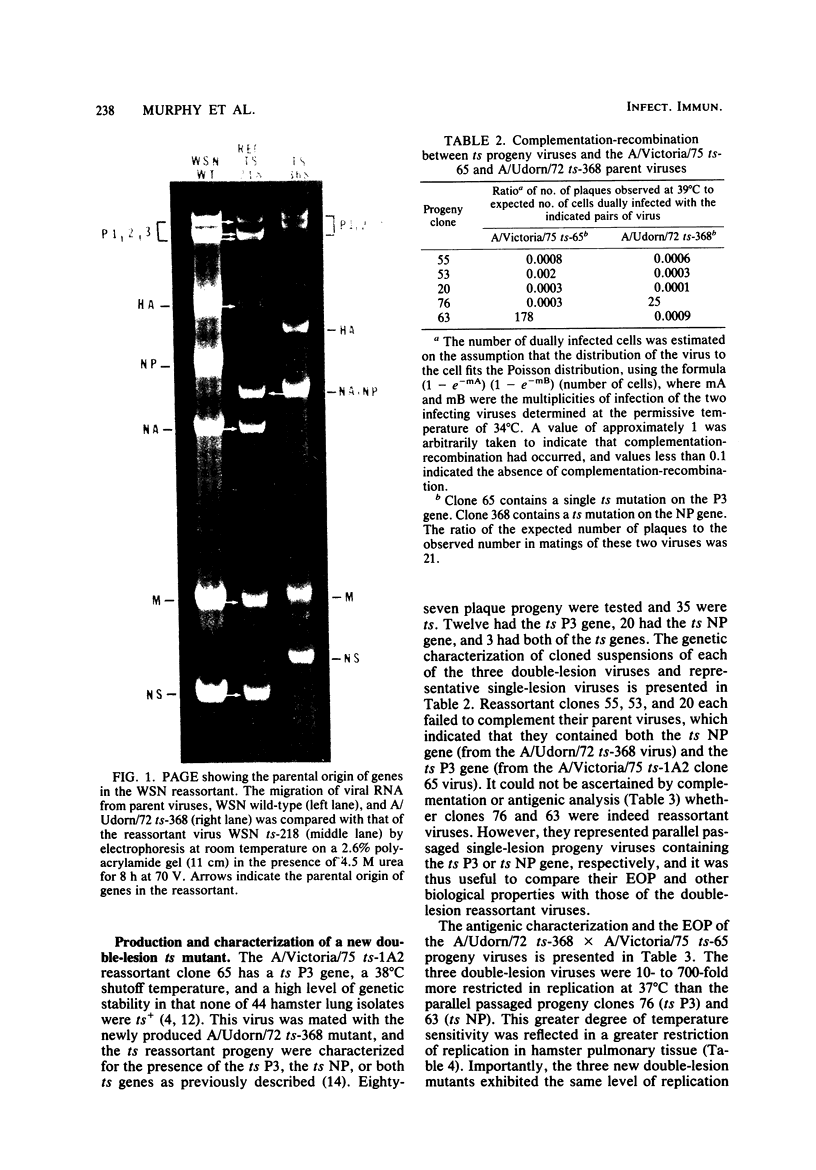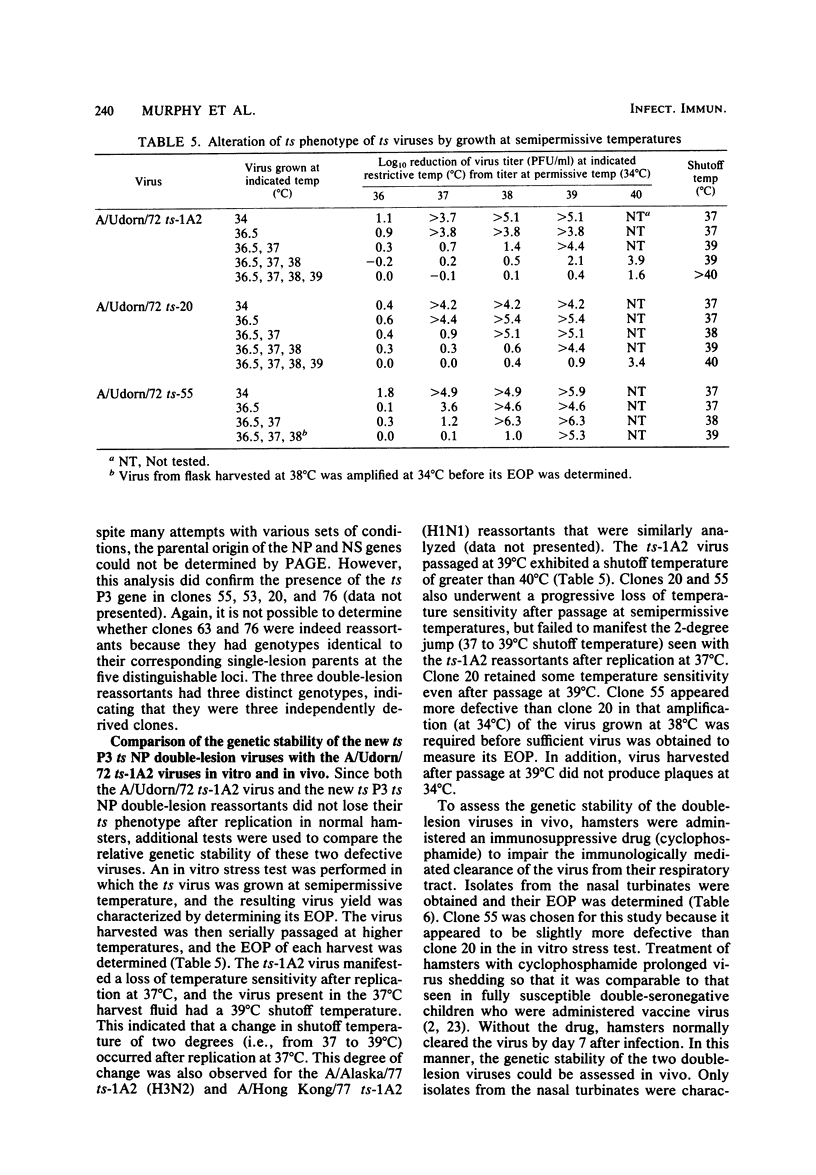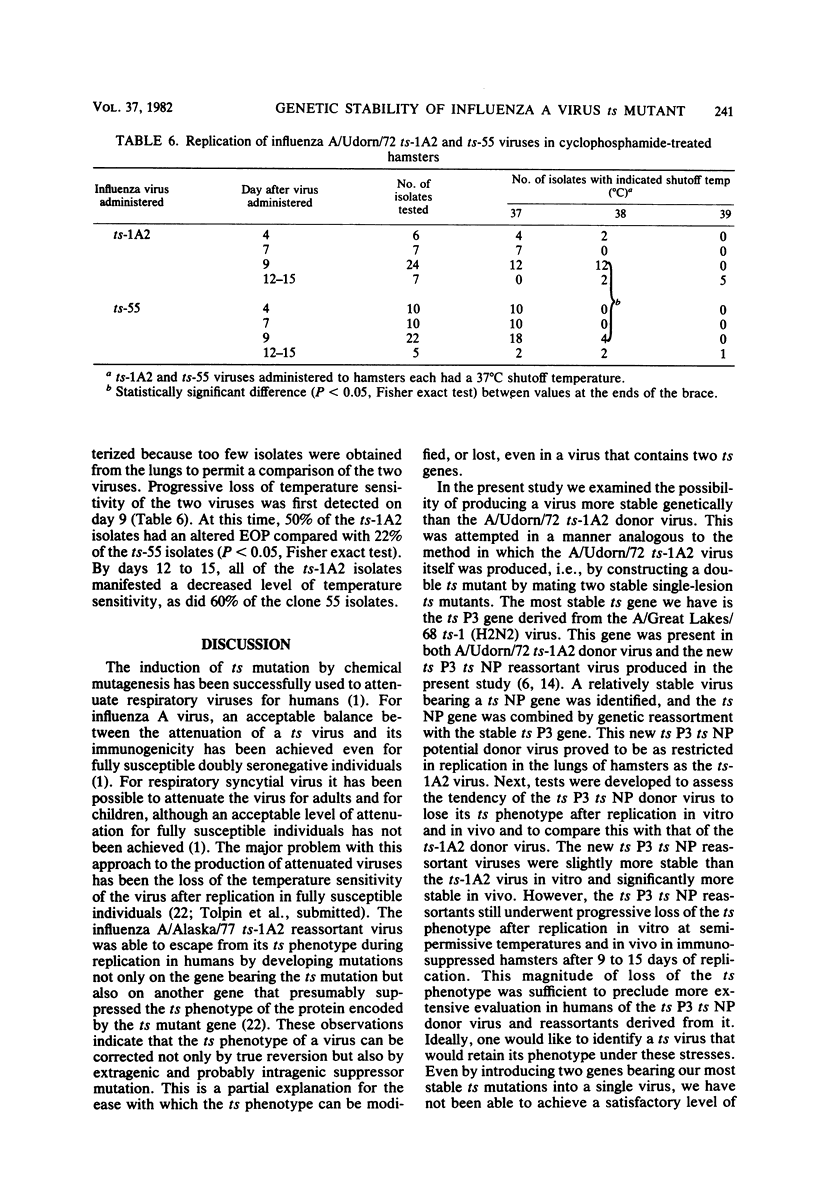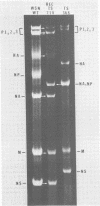Abstract
Temperature-sensitive (ts) reassortant vaccine strains derived from the A/Udorn/72 ts-1A2 donor virus were not sufficiently stable genetically in humans. We therefore sought to produce a new, more stable donor virus. We had previously identified a stable ts virus with a ts P3 gene and in the current study identified another relatively stable single-lesion ts virus with a ts mutation in the NP gene. A new ts reassortant virus was constructed by mating these two single mutants and by isolating three reassortant progeny, clones 20, 53, and 55, that contained both a ts P3 and a ts NP gene. These reassortant progeny possessed a 37 to 38°C shutoff temperature and were as restricted in their replication in hamster lungs as the A/Udorn/72 ts-1A2 virus. All isolates from the lungs and nasal turbinates of hamsters were temperature sensitive. An in vitro stress test was used to determine whether the new ts P3 ts NP reassortant virus would undergo loss of its ts phenotype after replication at semipermissive temperature. Clone 20 and 55 reassortants underwent progressive loss of their ts phenotype in vitro, although at a rate slightly less than that of the A/Udorn/72 ts-1A2 virus. The level of genetic stability after replication in vivo was assessed in cyclophosphamide-treated hamsters in which virus replication continued for up to 15 days. Again, both the A/Udorn/72 ts-1A2 and the new ts P3 ts NP reassortant clone 55 manifested a progressive loss of temperature sensitivity after 7 days of replication. Clone 55 virus lost temperature sensitivity significantly less rapidly than the A/Udorn/72 ts-1A2 virus. These results indicated that, although the new ts P3 ts NP reassortant virus was more stable than the A/Udorn/72 ts-1A2 virus, it nevertheless underwent progressive loss of temperature sensitivity after replication in vitro and in vivo. Therefore, it does not appear to be a satisfactory donor virus. This experience plus that gained earlier with other ts mutants of influenza A virus suggest that influenza A virus mutants that rely solely upon their ts phenotype for attenuation are unlikely to exhibit the phenotypic stability required of a vaccine virus. Other genetic techniques are needed to produce more stable influenza A virus strains.
Full text
PDF







Images in this article
Selected References
These references are in PubMed. This may not be the complete list of references from this article.
- Chanock R. M., Murphy B. R. Use of temperature-sensitive and cold-adapted mutant viruses in immunoprophylaxis of acute respiratory tract disease. Rev Infect Dis. 1980 May-Jun;2(3):421–432. doi: 10.1093/clinids/2.3.421. [DOI] [PubMed] [Google Scholar]
- Kim H. W., Arrobio J. O., Brandt C. D., Parrott R. H., Murphy B. R., Richman D. D., Chanock R. M. Temperature-sensitive mutants of influenza A virus: response of children to the influenza A/Hong Kong/68-ts-1(E) (H3N2) and influenza A/Udorn/72-ts-1(E) (H3N2) candidate vaccine viruses and significance of immunity to neuraminidase antigen. Pediatr Res. 1976 Apr;10(4):238–242. doi: 10.1203/00006450-197604000-00008. [DOI] [PubMed] [Google Scholar]
- Markoff L. J., Thierry F., Murphy B. R., Chanock R. M. Relationship of genotype of recombinants of influenza A/Hong Kong/68-ts-1[E]virus used as live virus vaccines to virulence in humans. Infect Immun. 1979 Oct;26(1):280–286. doi: 10.1128/iai.26.1.280-286.1979. [DOI] [PMC free article] [PubMed] [Google Scholar]
- Massicot J. G., Murphy B. R., Thierry F., Markoff L., Huang K. Y., Chanock R. M. Temperature-sensitive mutants of influenza virus. Identification of the loci of the two ts lesions in the Udorn-ts-1A2 donor virus and the correlation of the presence of these two ts lesions with a predictable level of attenuation. Virology. 1980 Feb;101(1):242–249. doi: 10.1016/0042-6822(80)90499-7. [DOI] [PubMed] [Google Scholar]
- Massicot J. G., Murphy B. R., van Wyke K., Huang K. Y., Chanock R. M. ts P1 and P3 genes are responsible for satisfactory level of attenuation of ts-1A2 recombinants bearing H1N1 or H3N2 surface antigens of influenza A virus. Virology. 1980 Oct 15;106(1):187–190. doi: 10.1016/0042-6822(80)90241-x. [DOI] [PubMed] [Google Scholar]
- Mills J., Chanock V., Chanock R. M. Temperature-sensitive mutants of influenza virus. I. Behavior in tissue culture and in experimental animals. J Infect Dis. 1971 Feb;123(2):145–157. doi: 10.1093/infdis/123.2.145. [DOI] [PubMed] [Google Scholar]
- Murphy B. R., Chanock R. M., Douglas R. G., Betts R. F., Waterman D. H., Holley H. P., Jr, Hoover D. L., Suwanagool S., Nalin D. R., Levine M. M. Temperature-sensitive mutants of influenza A virus: evaluation of the Alaska/77-ts-1A2 temperature-sensitive recombinant virus in seronegative adult volunteers. Arch Virol. 1980;65(2):169–173. doi: 10.1007/BF01317328. [DOI] [PubMed] [Google Scholar]
- Murphy B. R., Chanock R. M., Levine M. M., van Blerk G. A., Berquist E. J., Douglas R. G., Betts R. F., Couch R. B., Cate T. R., Jr Temperature-sensitive mutants of influenza A virus: evaluation of the A/Victoria/75-ts-1A2 temperature-sensitive recombinant virus in seronegative adult volunteers. Infect Immun. 1979 Feb;23(2):249–252. doi: 10.1128/iai.23.2.249-252.1979. [DOI] [PMC free article] [PubMed] [Google Scholar]
- Murphy B. R., Hosier N. T., Chanock R. M. Temperature-sensitive mutants of influenza A virus: transfer of the two temperature-sensitive lesions in the Udorn/72-ts-1A2 virus to the A2Hong Kong/123/77 (H1N1) wild-type virus. Infect Immun. 1980 Jun;28(3):792–798. doi: 10.1128/iai.28.3.792-798.1980. [DOI] [PMC free article] [PubMed] [Google Scholar]
- Murphy B. R., Maassab H. F., Wood F. T., Jr, Chanock R. M. Characterization of the temperature sensitive phenotype of the A/Ann Arbor/6/60 cold-adapted virus and its recombinants. Infect Immun. 1981 May;32(2):960–963. doi: 10.1128/iai.32.2.960-963.1981. [DOI] [PMC free article] [PubMed] [Google Scholar]
- Murphy B. R., Rennels M. B., Douglas R. G., Jr, Betts R. F., Couch R. B., Cate T. R., Jr, Chanock R. M., Kendal A. P., Maassab H. F., Suwanagool S. Evaluation of influenza A/Hong Kong/123/77 (H1N1) ts-1A2 and cold-adapted recombinant viruses in seronegative adult volunteers. Infect Immun. 1980 Aug;29(2):348–355. doi: 10.1128/iai.29.2.348-355.1980. [DOI] [PMC free article] [PubMed] [Google Scholar]
- Murphy B. R., Wood F. T., Massicot J. G., Chanock R. M. Temperature-sensitive mutants of influenza A virus. Transfer of the two ts-1A2 ts lesions present in the Udorn/72-ts-1A2 donor virus to the influenza A/Alaska/6/77 (H3N2) wild type virus. Arch Virol. 1980;65(2):175–186. doi: 10.1007/BF01317329. [DOI] [PubMed] [Google Scholar]
- Murphy B. R., Wood F. T., Massicot J. G., Chanock R. M. Temperature-sensitive mutants of influenza virus. XVI. Transfer of the two ts lesions present in the Udorn/72-ts-1A2 donor virus to the Victoria/3/75 wild-type virus. Virology. 1978 Jul 15;88(2):244–251. doi: 10.1016/0042-6822(78)90281-7. [DOI] [PubMed] [Google Scholar]
- Murphy B. R., Wood F. T., Massicot J. G., Spring S. B., Chanock R. M. Temperature-sensitive mutants of influenza virus. XV. The genetic and biological characterization of a recombinant influenza virus containing two ts lesions produced by mating two complementing, single lesion ts mutants. Virology. 1978 Jul 15;88(2):231–243. doi: 10.1016/0042-6822(78)90280-5. [DOI] [PubMed] [Google Scholar]
- Palese P., Ritchey M. B. Live attenuated influenza virus vaccines. Strains with temperature-sensitive defects in P3 protein and nucleoprotein. Virology. 1977 May 1;78(1):183–191. doi: 10.1016/0042-6822(77)90090-3. [DOI] [PubMed] [Google Scholar]
- Richman D. D., Murphy B. R., Chanock R. M., Gwaltney J. M., Jr, Douglas R. G., Betts R. F., Blacklow N. R., Rose F. B., Parrino T. A., Levine M. M. Temperature-sensitive mutants of influenza A virus. XII. Safety, antigenicity, transmissibility, and efficacy of influenza A/Udorn/72-ts-1[E] recombinant viruses in human adults. J Infect Dis. 1976 Dec;134(6):585–594. [PubMed] [Google Scholar]
- Richman D. D., Murphy B. R., Spring S. B., Coleman M. T., Chanock R. M. Temperature sensitive mutants of influenza virus. IX. Genetic and biological characterization of TS-1[E] lesions when transferred to a 1972 (H3N2) influenza A virus. Virology. 1975 Aug;66(2):551–562. doi: 10.1016/0042-6822(75)90227-5. [DOI] [PubMed] [Google Scholar]
- Spring S. B., Maassab H. F., Kendal A. P., Murphy B. R., Chanock R. M. Cold adapted variants of influenza A. II. Comparison of the genetic and biological properties of ts mutants and recombinants of the cold adapted A/AA/6/60 strain. Arch Virol. 1977;55(3):233–246. doi: 10.1007/BF01319909. [DOI] [PubMed] [Google Scholar]
- Spring S. B., Nusinoff S. R., Tierney E. L., Richman D. D., Murphy B. R., Chanock R. M. Temperature-sensitive mutants of influenza. VIII. Genetic and biological characterization of TS mutants of influenza virus A (H3N2) and their assignment to complementation groups. Virology. 1975 Aug;66(2):542–550. doi: 10.1016/0042-6822(75)90226-3. [DOI] [PubMed] [Google Scholar]
- Thierry F., Spring S. B., Chanock R. M. Localization of the Ts defect in two Ts mutants of influenza A virus: evidence for the occurrence of intracistronic complementation between Ts mutants of influenza A virus coding for the neuraminidase and nucleoprotein polypeptides. Virology. 1980 Mar;101(2):484–492. doi: 10.1016/0042-6822(80)90462-6. [DOI] [PubMed] [Google Scholar]
- Thierry F., Spring S. B. Localization of the ts defects of ts mutants of influenza A virus using complementation analysis and gel analysis of the RNA segments of recombinants. Virology. 1981 Nov;115(1):137–148. doi: 10.1016/0042-6822(81)90096-9. [DOI] [PubMed] [Google Scholar]
- Tolpin M. D., Massicot J. G., Mullinix M. G., Kim H. W., Parrott R. H., Chanock R. M., Murphy B. R. Genetic factors associated with loss of the temperature-sensitive phenotype of the influenza A/Alaska/77-ts-1A2 recombinant during growth in vivo. Virology. 1981 Jul 30;112(2):505–517. doi: 10.1016/0042-6822(81)90298-1. [DOI] [PubMed] [Google Scholar]
- Wright P. F., Sell S. H., Shinozaki T., Thompson J., Karzon D. T. Safety and antigenicity of influenza A/Hong Kong/68-ts-1 (E) (H3N2). J Pediatr. 1975 Dec;87(6 Pt 2):1109–1116. doi: 10.1016/s0022-3476(75)80123-5. [DOI] [PubMed] [Google Scholar]



